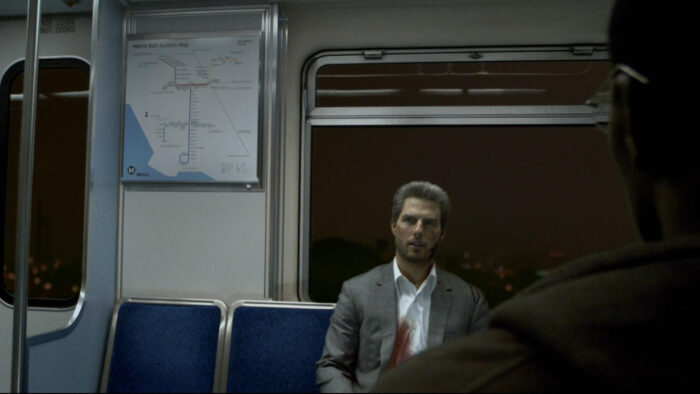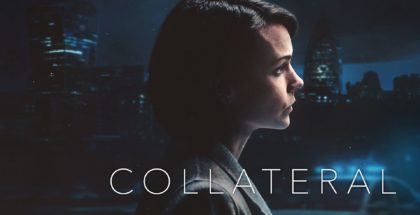VOD film review: Collateral
Review Overview
Cast
8Location
8Look
8David Farnor | On 06, Sep 2020
Director: Michael Mann
Cast: Tom Cruise, Jamie Foxx, Jada Pinkett Smith, Mark Ruffalo
Certificate: 15
“I can’t drive you around while you’re killing folks. It ain’t my job.” “Tonight it is.” That’s the sound of Max (Jamie Foxx) and Vincent (Tom Cruise) crossing paths in Michael Mann’s Collateral. An intense two-hander about two men from opposite sides of the track, it’s a blistering counterpart to Mann’s iconic Heat; where that introduced us to a cop and a criminal destined to collide but rarely meeting, Collateral puts both men in the same car and doesn’t let them leave for the best part of 120 minutes.
Max is a cab driver who does graveyard shifts in LA – a gig that he’s been carrying out on a temporary basis… for 12 years. Vincent is an assassin who catches a ride from the airport – it’s only after agreeing with Max that he’ll turn his exclusive driver until morning that Max realises every stop they’re making is another kill.
The result is a visceral fable of fate and occupation, watching two figures driven by their jobs to increasingly heated extremes. “Most people – same job, same gig, doing the same thing 10 years from now. Us, we don’t know what we are doing 10 minutes from now,” reflects Vincent, but as the pair’s trajectories intertwine, it becomes clear that both men share not an unpredictable occupation, but an essential one; they are both determined to do what they do to the best degree possible and get it done as soon as possible.
Maybe it’s a masculine thing, maybe it’s a Mann thing. Either way, that shared priority teases out their differences in every other regard. Both men exist on the edge of society, but Vincent is detached from everything, preferring to deliver nihilistic monologues rather than engage in a conversation, while Max is a professional who lives to make his passengers welcome and relaxed. Tom Cruise is a physical actor, and he channels that into a chillingly precise portrait of a killer, all pristine grey suits and swift double-taps to the chest. Jamie Foxx, who was at the time mostly known as a comedian, proves himself a fine match for the A-lister, a talker who can jump between anger, confusion and shock within the same sentence.
They rile each other up the more time they spend with each other, Max disrupting Vincent’s fastidious schedule and Vincent sparking so much fear in Max that he won’t survive the ride that his calm evening descends into desperate measures. Stuart Beattie’s script keenly steers them towards a relatively conventional showdown, but finds moments of awkward humour along the way, particularly when Vincent meets Max’s mum.
Mann, meanwhile, helms it with a masterful sense of pace and location. The former allows Collateral to slow down for a stunning jazz sequence that could be a short film in its own right. But it’s the location that really sings here, as Mann and DoPs Dion Beebe (Miami Vice) and Paul Cameron experiment with the possibilities of digital photography to fully capture nocturnal LA. The first feature to use Viper FilmStream HD Cameras, Collateral thrums with the buzz of a city not quite at sleep, lit by neon strips, cab lights, muzzle flashes and clubs. One sequence that sees Audioslave’s Shadow on the Sun accompany a lone wolf roaming the streets would be corny if it didn’t look – and sound – so cool.
Beattie’s script went through several hands before it arrived on Mann’s bonnet, but the director’s signature digital aesthetic is what gives Collateral its gripping, thrilling edge, helping to sketch out in full the existence of these two outsiders without any facade or superficial sheen. Through that lens, the coincidence involving Jada Pinkett Smith’s similarly focused lawyer is an easy one to swallow, and the stripped down finale – that sees two strangers on a train pass each other in the night – is a gorgeously sparse piece of cinema. This is Michael Mann’s job – and he’s rarely been better at doing it.

















